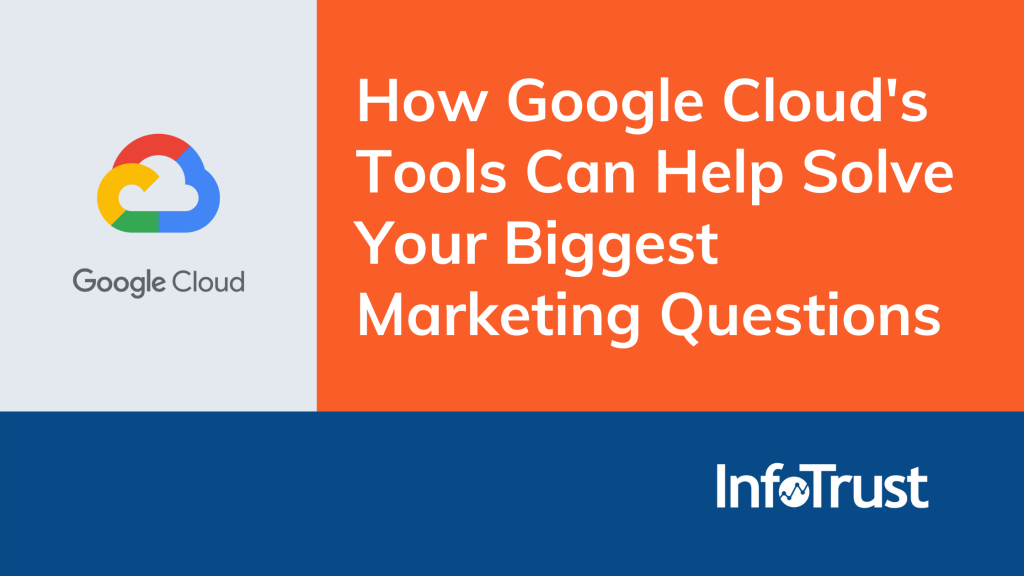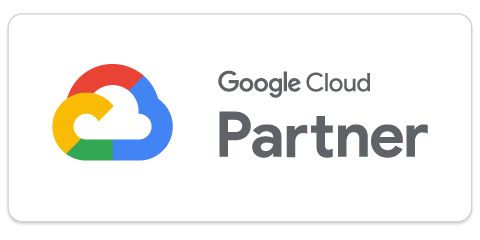The phrase “the cloud” is everywhere in marketing these days, but there’s still a lot of mystery around what it actually means. When many marketers use the term, they’re typically referring primarily to cloud storage. But the reason that cloud environments have become so powerful is because they offer so many different tools—not just storage—that can help you make the most of your customer data.
Elsewhere, I’ve explained why the cloud is critical for helping marketers solve some of their biggest problems. But that still doesn’t fully answer what kinds of tools Google Cloud puts at their disposal for solving those problems.
You will have a team of data science and engineering experts to deal with the technical ins-and-outs of these tools, but to make sure you’re asking and answering the right questions with your data, you must understand what solutions are available. Below, I’ll provide an overview of the four main categories of tools built into Google Cloud and explain why they’re vital to your marketing success.

Storage and Analytics
When we’re talking about the cloud, most people are familiar with the concept of storage—a cheap, scalable place to combine all your customer marketing and analytical data sources. Analytics simply refers to the ability to be able to query that data and do other computational processes on top of it.
When you have a massive amount of data, storage quickly becomes an issue. That’s why Google offers BigQuery, an enterprise data warehouse, that works as a central place to store your data and gain quick insights. Once you’ve collected all your data in BigQuery, you can leverage the suite of cloud tools that I’ll mention below.
While BigQuery is the destination, sometimes data needs a place to land before it’s turned into SQL-like formats. This is where cloud storage comes in. Cloud storage is long-term file storage done cheaply—it allows you to store .csv and .xml files temporarily before being fully processed. Cloud storage can also act as a very cheap backup for your file based storage systems.
All in all, this set of tools focuses on building a one-stop-shop in the cloud where you can integrate, access, maintain—and ultimately, make the most of—your data.
Ingestion
Ingestion is the ability to stream your own first-party data or third-party data streams directly into your cloud environment, which allows you to get real-time data from all your sources.
In other words, let’s say that your organization does booming business online, but you also have some brick-and-mortar locations scattered around the country. With BigQuery, you can collect that data in one place, but you need a solid set of ingestion tools to make sure it’s being streamed to the cloud right away. This is critical if you want your models to be built on the most accurate data possible.
Let’s say you have multiple data sets, and you’re combining data from an outside source that isn’t already stored in BigQuery, like Facebook. To pull data from that source, it will need to be extracted, transformed, and loaded into BigQuery. That might mean switching some uppercase letters, removing some data, combining it into a new table, etc.
Dataprep and Dataflow are two key ingestion tools that will help pull the data from an API, transform it, and combine it with other data sources into a more enriched, actionable dataset that can serve your business needs.
Machine Learning
One of the main reasons you’re extracting, integrating, and storing your data in the first place is because you want to use it to solve some otherwise intractable problems: What’s my customer lifetime value? What are the future marketing trends I should be prepared for? What knowledge can I gain about my customers’ needs from the comments they’re leaving on our site?
Google’s suite of machine learning tools allows you to understand your data better so you can predict patterns, fill data gaps, and build models that will allow you to answer these kinds of questions.
Using tools like AutoML, you can predict the future for your marketing and analytics data, which makes it possible for you to react to events that haven’t even happened yet. Machine learning will give you a deeper understanding of why your customers buy and give you the ability to better segment your customers using certain criteria.
Serving
Serving empowers you to use your marketing and analytics data to build a customized experience for users. Where machine learning gives you insights, serving allows you to actually make use of those insights and serve personalized content.
For example, you can use App Engine, Cloud Functions, or a CDN to read your marketing and analytics profiles, determine whether someone is a high-value customer, and show them a coupon.
In essence, these tools allow you to create models and analysis machines that can help you build a more personalized, meaningful relationship with your customers.
Improve Your Marketing Journey
By now, you can probably see that the cloud is far more than a dumping ground for data. In fact, it may be the most powerful asset at your disposal. Google Cloud offers a bundle of sophisticated solutions to marketing problems that, before now, have been difficult—or even impossible—to solve.
When we talk about the customer journey, we’re ultimately talking about the marketing journey you provide for the customer. That journey doesn’t have to be a wandering path, propelled by guesswork and good luck. Thanks to the cloud, you have the power to make your marketing speak directly to your customers in meaningful ways. With these four types of tools, you can connect with your customers on a deeper level than ever before.




